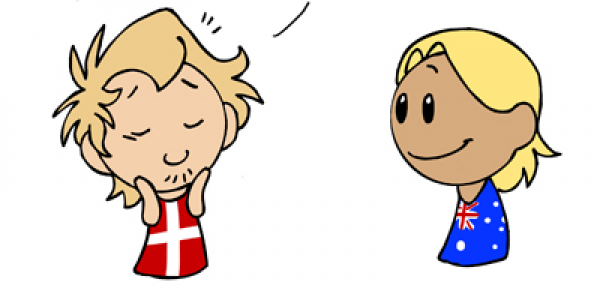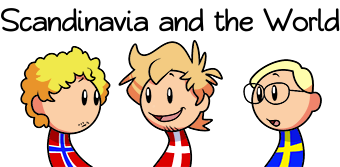Community made Fact Card:

In Australia they have a lottery called "Slikpik". Which is very funny for danes, because it literly spells, "Lick D*ck" in danish.
9 years ago #9674378
7
0
In the Faroes we have a game called Pikk (comes from 'at pikka' which translates as 'to tap') a variant of tag... It leads to some confused/bemused expressions when played with Danes as "at spille pikk" (to play pikk) means 'to masturbate' in Danish...
9 years ago #9681954
6
0
Here in Sweden we have many roadsigns informing us about "top fart", "infart" and "utfart". I still can't keep myself from giggling at it sometimes. Other classics are "slutstation", "fartkontroll" and "farthinder".
8 years ago #9753801
4
0
I suddenly start to understand why Holland keeps accusing me, Twenthe, of speaking Danish (or Scandinavian in general).
Slik/Slikke/Slikker/Slikkerye/Slikkergood, are words for: candy
Slik/Slikn/Slikkern/Slikkerye, are words for the ferb: to suckel or sabbel
and pik is, just as in any other proper self-respecting Germanic language d*ck.
______
Ironically when confronted with Twentish texts Holland asks me, staight faced, why I'm wrighting Swedish, eventhough he constantly calls me "that half German" though Google claims Norwegian.
I'm slowly starting to suffer a identity crisis, Twentish actually sounds like Enlish pronounced German, or the other way around.
(conclusion)
Tuvænsk is den nye wærldspråke!
Slik/Slikke/Slikker/Slikkerye/Slikkergood, are words for: candy
Slik/Slikn/Slikkern/Slikkerye, are words for the ferb: to suckel or sabbel
and pik is, just as in any other proper self-respecting Germanic language d*ck.
______
Ironically when confronted with Twentish texts Holland asks me, staight faced, why I'm wrighting Swedish, eventhough he constantly calls me "that half German" though Google claims Norwegian.
I'm slowly starting to suffer a identity crisis, Twentish actually sounds like Enlish pronounced German, or the other way around.
(conclusion)
Tuvænsk is den nye wærldspråke!
10 years ago #9528784
2
0
*looks at the "Golden Gay Time" ice cream*
.... This cannot be a coincidence....
.... This cannot be a coincidence....
7 years ago #9817841
1
0
In Swedish Mickey Mouse is called Musse Pigg, when I started working in Denmark my colleagues would ask me through fits of laughter if it was true that Mickey was called Musse Pik in Swedish. It didn’t matter that I corrected them on the spelling...
8 years ago #9709838
1
0
We do? I've lived in Australia for 53 years, and this is the first I've heard of it.
8 years ago #9698429
1
0
I've lived in Australia and I've never heard of this lottery. Must be a WA thing.
8 years ago #9691970
1
0
If I am not mistaken, 'pikku' in finnish language means "small", as in "the small guy".
In estonian language, 'pikk' means "tall". It used to be 'pitk', in finnish it is 'pitkä'.
päka+pikk means an elf, but literally it means "as tall / long / short as the balls of the feet".
In estonian language, 'pikk' means "tall". It used to be 'pitk', in finnish it is 'pitkä'.
päka+pikk means an elf, but literally it means "as tall / long / short as the balls of the feet".
9 years ago #9572596
1
1
I use the word "Schlangenwörter" (snake words) to describe those train-wreck compound nouns in other Germanic languages, because it's more descriptive than "compound noun". The problem is my fellow dirty-minded Americans only hear the first syllable, and they hear it as "shlong". That means "snake" in Yiddish, but also refers to a snake-like body part, and that's its only meaning in English. So then follows a lot of sniggering and lame jokes until we can get the conversation back on track
10 years ago #9535765
1
0
Dang... Trust those WA wing-nuts to do something like that... I can guarantee that that 'name' isn't used in any lotto system here in Victoria... Closest we have is a "Quick" pick...
~JD
~JD
10 years ago #9523127
1
0
I assume that would be "slikke" or "slikker"? Doesn't "slik" mean "candy"?
And yes, the lottery is real:
http://www.lotterywest.wa.gov.au/games/prices
And yes, the lottery is real:
http://www.lotterywest.wa.gov.au/games/prices
Add comment: Please Sign in or create an accout to comment.




































19